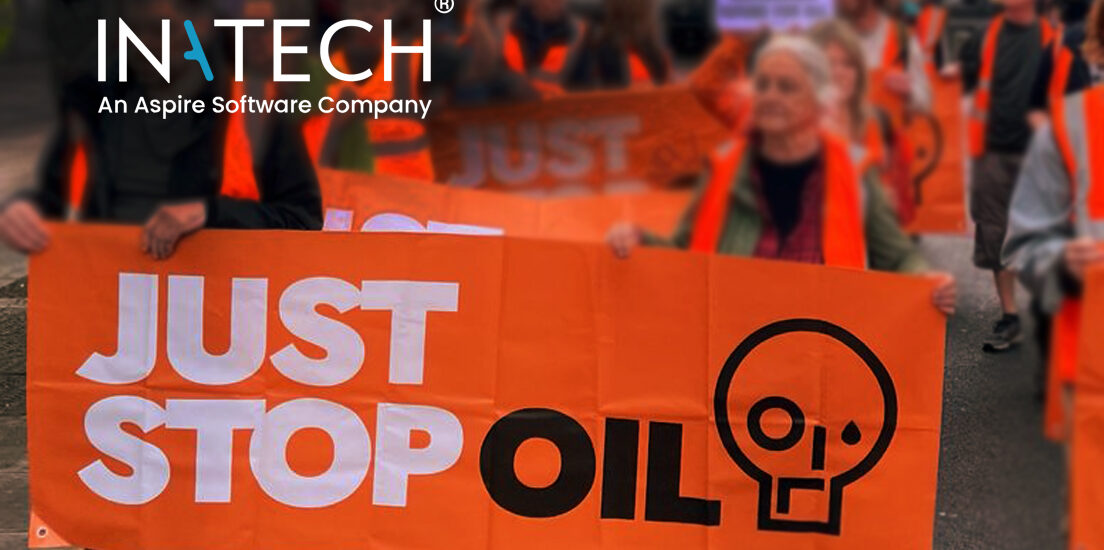If people want energy change, vote for it – Activism is pointless noise…
- July 25, 2023
- Posted by: Inatech ETRM
- Categories:

As we move through the passage of time towards the milestones when we’re supposed to have reached net zero, it’s more important than ever to take action to protect our planet – real action.
Many believe that the most effective way to change the current environmental situation is through activism. While these efforts are beneficial to an extent, there is a crucial way to actually make a practical difference which must not be overlooked – voting. By casting our ballots for politicians and policies that prioritise sustainable practices and developments, we can create lasting, systemic change.
In this article, we’ll explore why voting for energy change must not be overshadowed by activism, and how activism can be executed well.
Limitations of Activism in Achieving Energy Change
Protests from the British activist group, Just Stop Oil, show no signs of slowing down. On 29th June, three protesters were charged with aggravated trespass after invading the pitch at Lord’s during the second Ashes test.
This incident is the most recent in a chain of events that have occurred since 24th April. Other events that Just Stop Oil protests have disrupted include the snooker World Championship, the Chelsea Flower Show, and the Twickenham rugby final. And of course, the signature blocking of busy roads and petrol stations is ongoing.
These incidents have cost the Metropolitan police £4.5 million in six weeks. Wasting police time and resources is hardly going to go down well with the public, given the existing pressures the public services already face.
The Problem with Activism
Activism can be a powerful way to raise awareness about issues and create a sense of urgency around a cause when executed well. However, without backing it up with practical action i.e., voting, there won’t be significant change at a large scale.
First of all, activism often relies on the energy and passion of its participants, which can wane over time, and even if a movement is successful in raising awareness about an issue, it may not result in tangible policy changes.
Perhaps the reason activism appeals so much to some is the immediate impact it appears to have. People put their time and energy into whatever form the activism takes, whether that’s protesting outside no. 10 or blocking the roads. This may give protesters the feeling that they have accomplished something but in reality, there is not necessarily any measurable outcome.
Yes, activism can put pressure on politicians. However, as we’ve seen with the Just Stop Oil Protests, making the public angry by blocking the roads during rush hour or when urgent journeys are underway is not going to make anyone want to listen to what you have to say. It’s just not a good persuasion tactic, and could be counterproductive.
Such forms of activism are divisive and polarising, making it difficult to have genuine discussions and educate the wider public on the changes that are needed. The attention gained by these acts may help mobilise those who are already on-board, but educating the wider public so they may vote for parties supporting environmental issues means the net must be cast wider.
Alternative Drivers of Energy Change
Activism has a role to play in shaping energy policy, but in many cases, change has been driven by other factors, including the following:
- Technological advancements: As renewable technologies became more economically viable and efficient, governments worldwide adopted policies to incentivise their adoption, leading to increased renewable energy capacity without direct activism as the primary driver.
- Scientific evidence: Some changes to energy policy have been driven by scientific evidence which has led to the establishment of international agreements.
- Energy security concerns: Geopolitical factors and concerns about energy security have led some countries to diversify their energy sources, as we have seen since the war in Ukraine This, along with market-driven changes such as fluctuations in fossil fuel prices, has resulted in the implementation of policies to promote domestic energy production and reduce dependence on imports.
- Energy market reforms: Changes in policy have sometimes been driven by the need to reform energy markets. Market liberalisation and deregulation in some regions have allowed for increased competition and innovation in the sector.
The Right Form of Activism
Voting and activism are two interconnected approaches, but activism needs to be executed correctly in order to serve its purpose.
A good example of how activism has sparked real change is Germany’s Energiewende, or energy transition. This policy was initiated in 2010 with the goal of establishing a climate-neutral energy system by 2045 and a 65% reduction in emissions by 2030.
However, its origins go back to the 1970s when the German public protested against nuclear power due to safety concerns. Over the following years, prominent public figures, scientific research, and environmental and religious organisations influenced the change, among many other drivers – such as the oil crises of 1973 and 1979 and the Chernobyl disaster.
Essentially, there was a long road between the initial anti-nuclear protests and the policy implemented in 2010, with many influencing factors over the intermediary decades – however, perhaps the initial protests sparked something that may not have otherwise led to such extensive changes.
After all, Germany is now a world leader in renewable energy, with renewables accounting for 52% of the country’s electricity generation during the first half of 2023. The nation aims to increase this figure to 80% by 2030 and establish a mostly emission free supply by 2035.
With that in mind, what constitutes effective activism? This is a broad topic in itself and sociologists have been attempting to answer this question for decades, to no definitive end. It’s hard to measure the impact of any particular action. However, studies have shown what does not work – repeating the same act again and again, a lack of adaptation, and in-fighting.
Nonviolent and respectful engagement is often more conducive to achieving long-term change as opposed to certain tactics discussed earlier. Peaceful demonstrations, civil discourse, and constructive dialogue are more likely to attract public sympathy and build bridges with potential allies. Respectful engagement helps maintain credibility, fosters understanding, and enhances the likelihood of influencing decision-makers.
Conclusion
While activism is an important way to raise awareness about environmental issues, it needs to be executed in the correct way, and it must not overshadow the importance of voting. There are situations in which activism has worked, situations in which it hasn’t, and many in which it’s impossible to say.
As a result, if it’s going to be done, it needs to be done in a way that will get the right type of attention from the public. Only then will they want to pay attention and ultimately, vote for politicians that support energy change.
Inatech is a global provider of cloud based energy trading and risk management software with more than 20 years’ experience in international markets. Our energy trading software is equipped with advanced ETRM analytics and features for commodity risk management, credit risk, hedge analysis, and much more.
Our ETRM software solutions include an oil trading platform and natural gas ETRM. We also provide a renewable fuel ETRM supporting biofuels trading, biofuels hedging, carbon emission trading and more.
Contact us today to book a demo and discover how a cloud based ETRM system can help your people navigate the markets more efficiently than ever.




